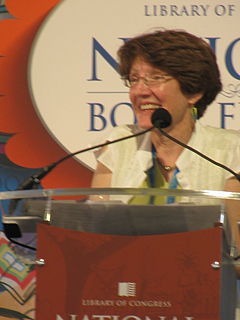A Quote by Brian Stableford
There are infimal readers, readers who want to read the same book over and over, but will never read the same book twice.
Related Quotes
Along the way, about certain things, you realize, "I don't know anything about this." You think, "Is this going to sound ridiculous?" So I pestered more than a hundred different people over the course of the book. And when I finished the book I gave it to six or seven trusted readers, who are always the same, but I also gave it to a brother of mine who's a doctor and I asked him to read it, and he was very helpful. It's good to have a group of trusted readers. As my kids have grown up, they've joined this group.
A reader is entitled to believe what he or she believes is consonant with the facts of the book. It is not unusual that readers take away something that is spiritually at variance from what I myself experienced. That's not to say readers make up the book they want. We all have to agree on the facts. But readers bring their histories and all sets of longings. A book will pluck the strings of those longings differently among different readers.
Sometimes I read the same books over and over and over. What's great about books is that the stuff inside doesn't change. People say you can't judge a book by its cover but that's not true because it says right on the cover what's inside. And no matter how many times you read that book the words and pictures don't change. You can open and close books a million times and they stay the same. They look the same. They say the same words. The charts and pictures are the same colors. Books are not like people. Books are safe.
A book is something that young readers can experience on their own time. They decide when to turn the page. They'll put their arm right on the page so you can't turn it because they're not ready to go to the next page yet. They just want to look at it again, or they want to read the book over and over because they really enjoy setting the pace themselves.
The book was long, and difficult to read, and Klaus became more and more tired as the night wore on. Occasionally his eyes would close. He found himself reading the same sentence over and over. He found himself reading the same sentence over and over. He found himself reading the same sentence over and over.
The genius of the Word of God is that it has staying power; it can stand up to repeated exposure. In fact, that's why it is unlike any other book. You may be an expert in a given field. If you read a book in that field two or three times you've got it. But that's never true of the Bible. Read it over and over again, and you'll see things that you've never seen before.






































